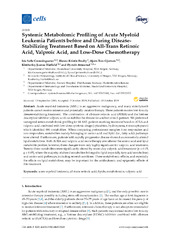Systemic Metabolomic Profiling of Acute Myeloid Leukemia Patients before and During Disease-Stabilizing Treatment Based on All-Trans Retinoic Acid, Valproic Acid, and Low-Dose Chemotherapy
Grønningsæter, Ida Sofie; Fredly, Hanne Kristin; Gjertsen, Bjørn Tore; Hatfield, Kimberley Joanne; Bruserud, Øystein
Peer reviewed, Journal article
Published version

Åpne
Permanent lenke
https://hdl.handle.net/1956/22422Utgivelsesdato
2019-10-10Metadata
Vis full innførselSamlinger
Originalversjon
https://doi.org/10.3390/cells8101229Sammendrag
Acute myeloid leukemia (AML) is an aggressive malignancy, and many elderly/unfit patients cannot receive intensive and potentially curative therapy. These patients receive low-toxicity disease-stabilizing treatment. The combination of all-trans retinoic acid (ATRA) and the histone deacetylase inhibitor valproic acid can stabilize the disease for a subset of such patients. We performed untargeted serum metabolomic profiling for 44 AML patients receiving treatment based on ATRA and valproic acid combined with low-dose cytotoxic drugs (cytarabine, hydroxyurea, 6-mercaptopurin) which identified 886 metabolites. When comparing pretreatment samples from responders and non-responders, metabolites mainly belonging to amino acid and lipid (i.e., fatty acid) pathways were altered. Furthermore, patients with rapidly progressive disease showed an extensively altered lipid metabolism. Both ATRA and valproic acid monotherapy also altered the amino acid and lipid metabolite profiles; however, these changes were only highly significant for valproic acid treatment. Twenty-three metabolites were significantly altered by seven-day valproic acid treatment (p < 0.05, q < 0.05), where the majority of altered metabolites belonged to lipid (especially fatty acid metabolism) and amino acid pathways, including several carnitines. These metabolomic effects, and especially the effects on lipid metabolism, may be important for the antileukemic and epigenetic effects of this treatment.
